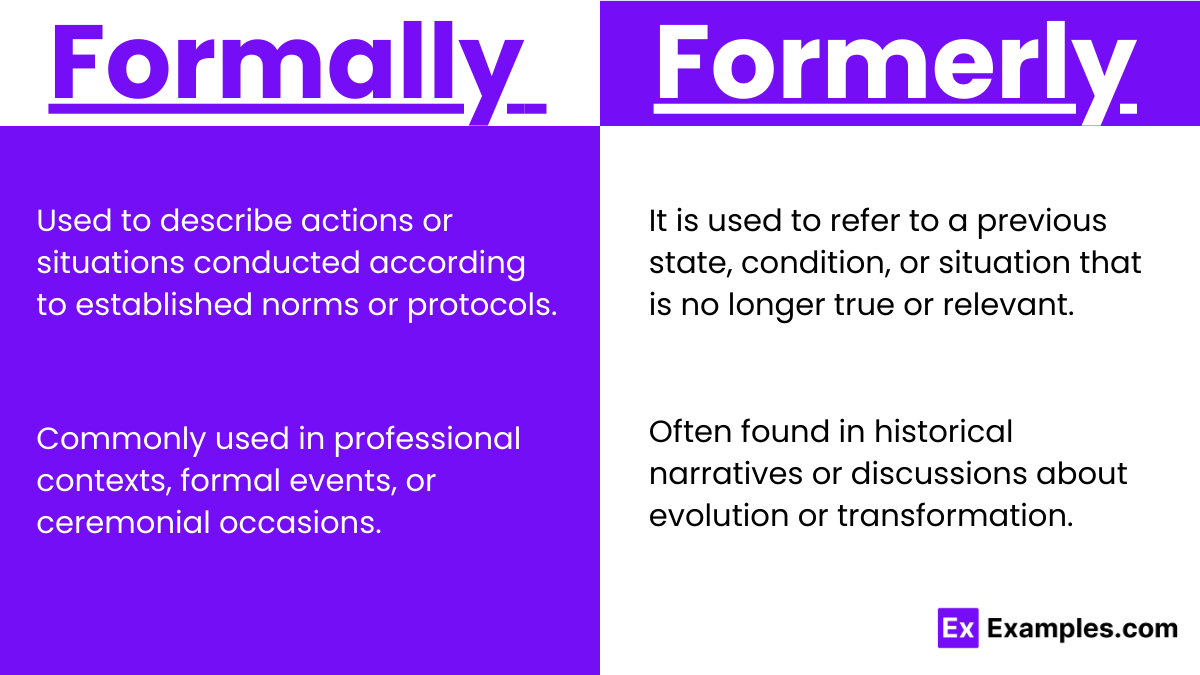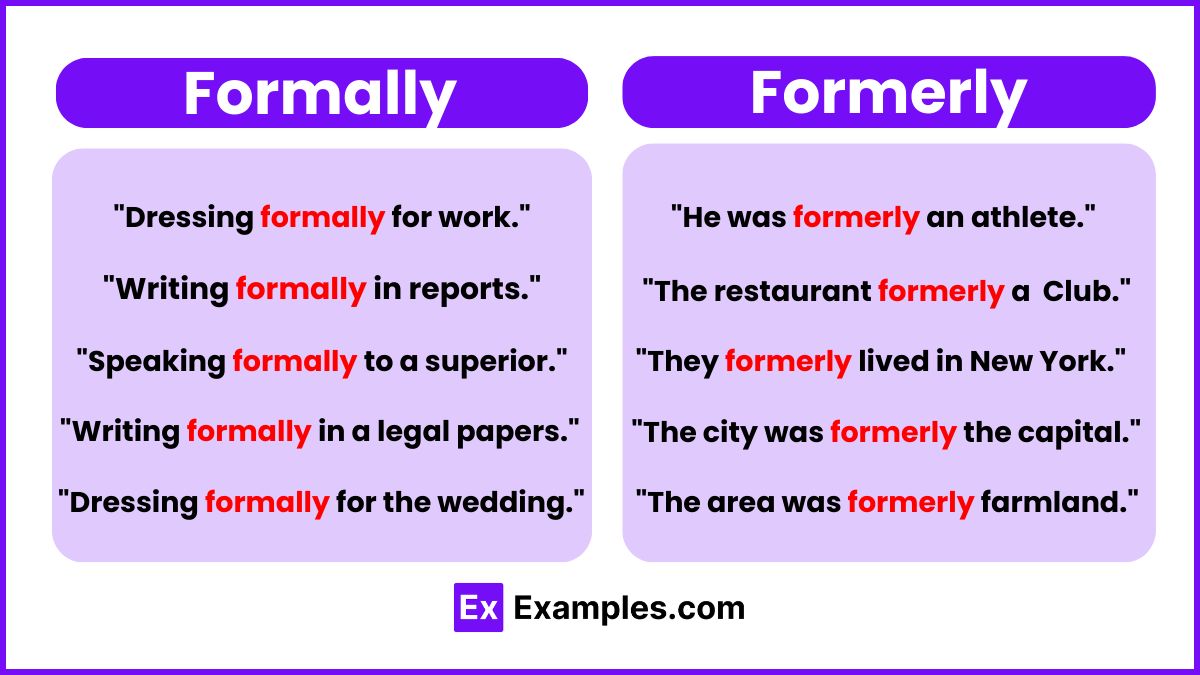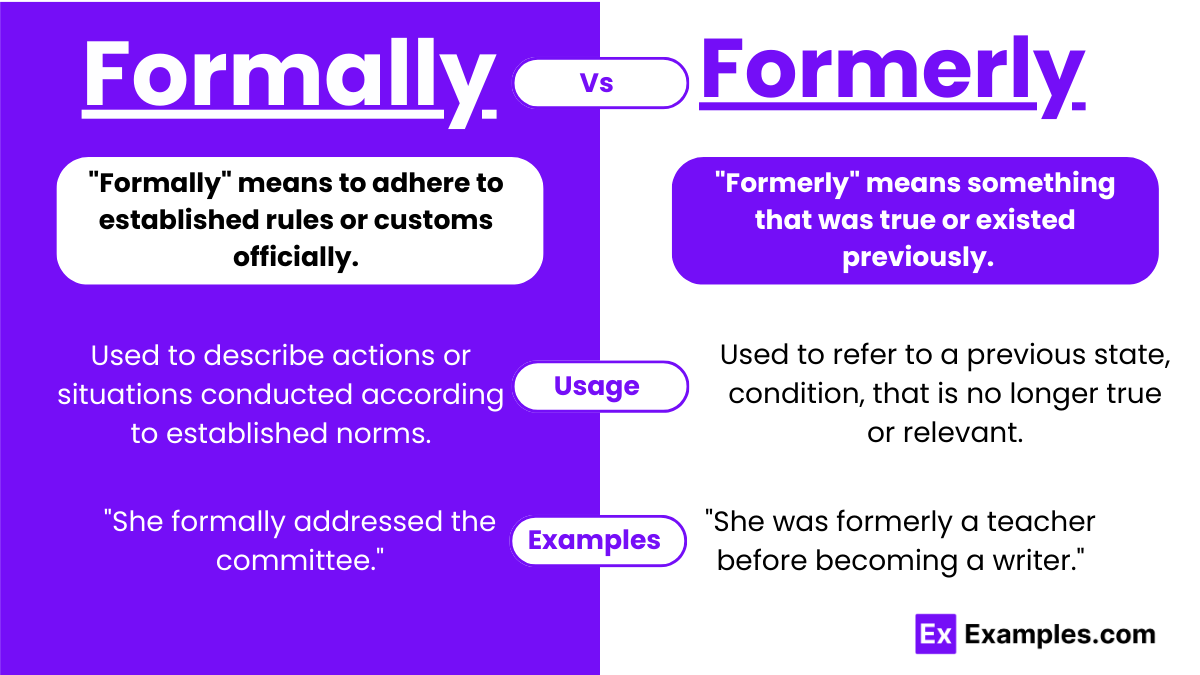Formally vs Formerly – Meanings, Differences, Usage, Examples
The two words, “Formally“, and “Formerly” seem very similar but have different meanings. “Formerly” talks about things that happened in the past, while “Formally” is about doing something officially or properly, like following rules. They look alike because they both start with “form-” and end with “-ly,” but that’s where the similarity ends.
Formally and Formerly – Meanings
- Formally : It is an adverb. It describes the manner in which something is done according to official rules, conventions, or etiquette. For example, “He dressed formally for the ceremony”, where “formally” modifies the verb “dressed” and indicates that the dressing was done in accordance with formal standards
- Formerly : It is an adverb. It describes something that existed or occurred in the past or refers to a previous state or condition. For example, “The building formerly housed a bookstore,” where “formerly” modifies the verb “housed” and indicates that the building served as a bookstore in the past.
Summary
How to Pronounce Formally and Formerly
- Formally : Pronounced as “for-muh-lee” and “/ˈfɔːr.mə.li/” with emphasis on the first syllable.
- Formerly : Pronounced as “for-mer-lee” and “/ˈfɔːr.mɚ.li/” with emphasis on the second syllable.
Differences Between Formally and Formerly
| Differences | Formally | Formerly |
|---|---|---|
| Type of Adverb | Indicates manner or mode | Denotes a previous time |
| Context of Usage | Formal situations | Refers to the past |
| Emphasis | Present or ongoing | Focused on past events |
| Associated Actions | Conduct, appearance | Historical events |
| Function | Specifies behavior | Indicates temporal change |
Tricks To Remember The Differences Between Formally and Formerly
- Past vs. Present: Associate “formerly” with the past tense “er” and “formally” with the present by focusing on the word “form.”
- Time Travel: Picture yourself in the past when using “formerly” and in the present when using “formally.”
- Formal Attire: Imagine dressing formally for an event when using “formally,” and think of historical events when using “formerly.”
- Word Association: Connect “formerly” with “former times” and “formally” with “formal occasions.”
- Context Clues: Pay attention to the context of the sentence. If it involves past events, use “formerly”; if it relates to proper behavior or appearance, use “formally.”
When to Use Formally and Formerly

Usage of Formally
- Used to describe actions or situations conducted according to established norms or protocols.
- It implies a sense of official or correctness in behavior or presentation.
- Commonly used in professional contexts, formal events, or ceremonial occasions.
Usage of Formerly
- It is used to refer to a previous state, condition, or situation that is no longer true or relevant.
- It denotes a change or transition from the past to the present.
- Often found in historical narratives or discussions about evolution or transformation.
How To Use Formally and Formerly
Formally
- Official Situations: Use “formally” when describing actions or events that require adherence to established rules or protocols.
- Professional Settings: Employ “formally” in contexts where a sense of professionalism or decorum is expected.
- Ceremonial Occasions: Use “formally” to convey the idea of adherence to tradition or ceremony.
- Proper Behavior: Describe behaviors or presentations as “formally” when they follow recognized standards or customs.
- Example: Dressing formally for a job interview demonstrates respect for the process.
Formerly
- Past States: Use “formerly” to describe something that was true, existed, or was the case in the past but is no longer so.
- Changes Over Time: Employ “formerly” to indicate a transition from a previous state or condition to the present.
- Historical Context: Use “formerly” in narratives or discussions about past events or situations.
- Evolution or Transformation: Describe how something has changed using “formerly” to denote its previous state.
Formally and Formerly – Examples

Formally:
- She formally addressed the committee.
- They will formally announce the decision tomorrow.
- We have formally invited them to the party.
- He is formally dressed for the interview.
- The report was formally submitted to the supervisor.
Formerly:
- The restaurant was formerly a bookstore.
- She was formerly a teacher before becoming a writer.
- They formerly lived in New York City.
- The company was formerly known as Smith & Sons.
- The building was formerly a warehouse.
Synonyms for Formally and Formerly
| Formally | Formerly |
|---|---|
| Officially | Previously |
| Properly | Once |
| Ceremonially | Earlier |
| Correctly | In the past |
| Respectfully | In former times |
Exercises
- She _______________ introduced as the new manager.
- They _______________ lived in that house before moving.
- The report will be _______________ submitted to the board.
- He _______________ worked as a lawyer before retiring.
- The ceremony was _______________ conducted with great pomp.
Answers:
- formally
- formerly
- formally
- formerly
- formally
FAQ’S
Is it Formally Known or Formerly Known?
It is “formerly known” when referring to a past status, while “formally known” indicates an official or proper designation in the present.
Is it Formally Met or Formerly Met?
It is “formerly met” for encounters in the past, while “formally met” implies official or proper meetings in the present.
How Do You Use the Word Formally?
Use “formally” to describe actions or situations conducted in a proper, official, or ceremonial manner, adhering to established standards or protocols.
What Is the Opposite of Formerly?
The opposite of “formerly,” indicating something that existed or occurred in the past, is “currently” or “presently,” referring to the current state or situation.



